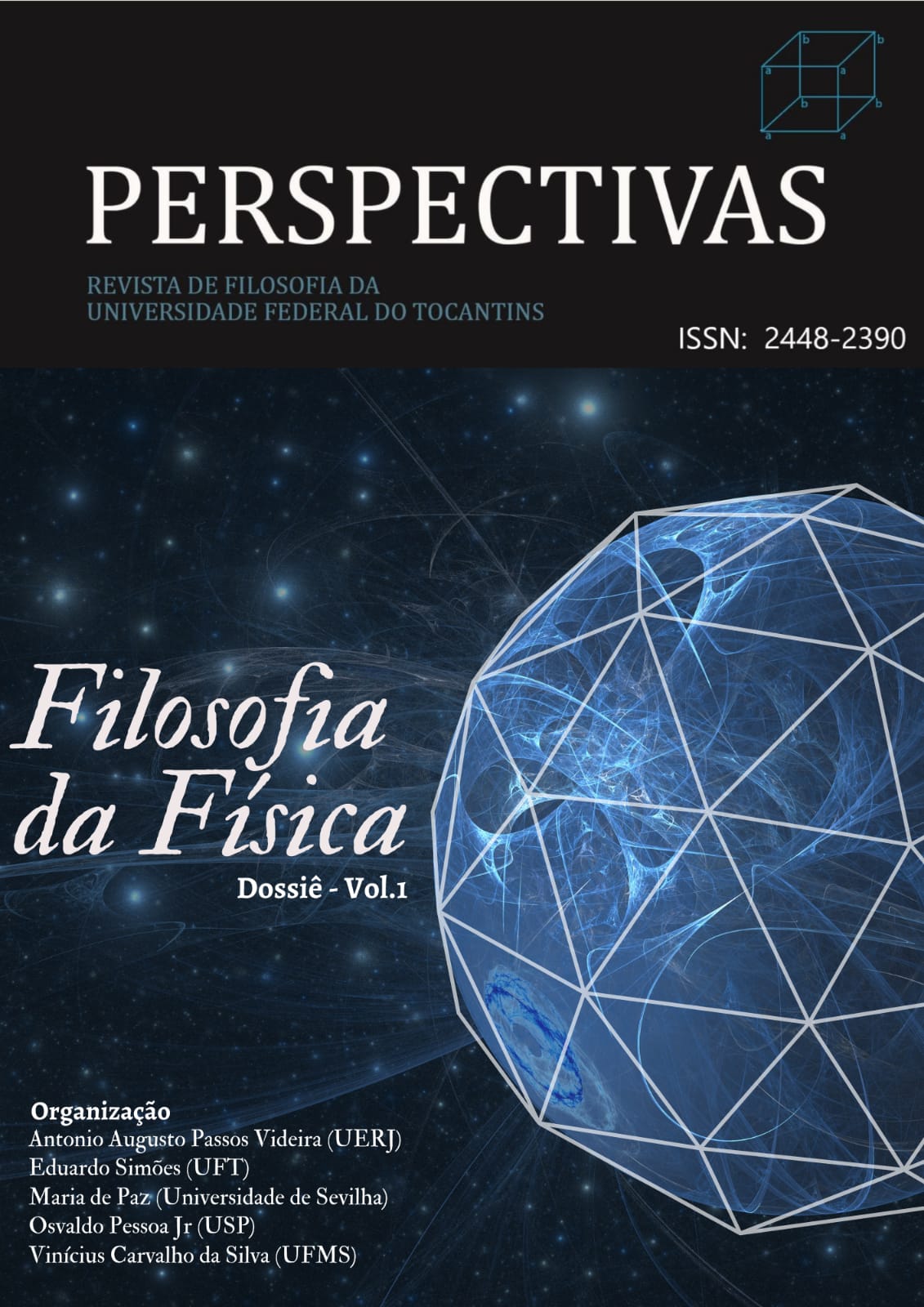Para uma Interpretação Emergentista do Problema da Medição
Uma hipótese de trabalho
DOI:
https://doi.org/10.20873/rpv7n2-47Resumo
Como é bem sabido, o problema da medição é um problema antigo – talvez mesmo o único problema - da Mecânica Quântica ou, pelo menos, de sua interpretação. Grosso modo, o problema da medição surge da transição de um sistema em Mecânica Quântica de um estado de superposição para um estado bem definido. Ou seja, da transição de um sistema num estado “quântico” para um “estado clássico”. Como também é bem conhecido, várias são as tentativas de solução para o problema de medição. Apesar de existir uma vasta gama de opções, a maioria das soluções apresentadas assume o pressuposto que a Mecânica Quântica é aplicável, em princípio, universalmente; isto é, a todos sistemas físicos. No entanto, talvez possamos questionar essa suposição e talvez essa suposição seja o que torna o problema de medição problemático. Este artigo tem como objetivo i) analisar o pressuposto da universalidade da aplicabilidade da Mecânica Quântica e consequências para a formulação do problema da medição; ii) explorar a ideia de que as entidades clássicas não são ontologicamente redutíveis, mas emergentes de entidades quânticas.
Referências
Bächtold, M. (2008). Five Formulations of the Quantum Measurement Problem in the Frame of the Stand-ard Interpretation. J Gen Philos Sci, 39: 17-33.
Bacciagaluppi, G. (2020). The Role of Decoherence in Quantum Mechanics. The Stanford Encyclopedia of Philosophy (Fall 2020 Edition), Edward N. Zalta (ed.).
Bohm, D. (1951). Quantum Theory. Prentice-Hall. New Jersey.
Cordovil, J.L., Santos, G.C. & Symons, J. Reconciling Ontic Structural Realism and Ontological Emer-gence. Found Sci (2022)
Crowther, K. As below, so before: ‘synchronic’ and ‘diachronic’ conceptions of spacetime emer-gence. Synthese 198, 7279–7307 (2021)
De Broglie, L. and Andrade e Silva, JL. (1971). La Réinterprétation de la Mécanique Ondulatoire. Gauthier- Villards. Paris.
Dirac, P. A. M. (1930). The principles of quantum mechanics. Oxford University Press. Oxford.
Esfeld, M. (2014). “The primitive ontology of quantum physics: Guidelines for an assessment of the pro-posals”, Studies in History and Philosophy of Modern Physics, 47 (2014): 99–106
Esfeld, Michael & Deckert, Dirk-Andre (2017). A Minimalist Ontology of the Natural World. Routledge.
French, S. (2014). The Structure of the World: Metaphysics and Representation. Oxford University Press. Oxford.
Ghirardi, G.C., Rimini, A., e Weber, T. (1986). Unified Dynamics for Microscopic and Macroscopic Systems. Physical Review D, 34: 470-91.
Ghirardi, G.C., Grassi, R. & Pearle (1990), P. Relativistic dynamical reduction models: General framework and examples. Found Phys 20, 1271–1316 (1990). https://doi.org/10.1007/BF01883487
Hendry, Robin 2019, “Emergence in Chemistry: Substance and Structure”, in S. Gibb, R. Hendry, and T. Lancaster (eds.), The Routledge Handbook of Emergence, Abingdon: Routledge, 339–351.
Jammer, Max. (1974). The Philosophy of Quantum Mechanics: The Interpretations of Quantum Mechanics in Historical Perspective. Wiley-Interscience. New York.
Landsman, N. (2007). Between classical and quantum. Handbook of the Philosophy of Science 2:417-553
Ladyman, J. and Ross, D. (2007). Everything must go: Metaphysics naturalized. Oxford University Press. Oxford.
Langton, R. and Lewis, D. (1998). Defining Intrinsic. Philosophy and Phenomenological Research, 58: 333-345.
Lazarovici, D., Oldofredi, A. and Esfeld, M. (2018). Observables and Unobservables in Quantum Mechanics: How the No-Hidden-Variables Theorems Support the Bohmian Particle Ontology. Entropy 2018, 20, 381: 116-132.
Le Bihan, B. Spacetime emergence in quantum gravity: functionalism and the hard prob-lem. Synthese 199, 371–393 (2021).
Lewis, D. (2001). Redefining ‘Intrinsic’. Philosophy and Phenomenological Research, 63: 381-398.
Lewis, D. (1986). On the Plurality of Worlds. Blackwell. Oxford.
Maudlin, T (1995). Three measurement problems. Topoi 14: 7–15 (1995).
Myrvold, Wayne. (2018). Philosophical Issues in Quantum Theory. In: Edward N. Zalta (ed.), The Stanford Encyclopedia of Philosophy.
Neumann, J. Von. (2018). Mathematical Foundations of Quantum Mechanics: new Edition (Robert T. Beyer, Trans.). Princeton University Press. Princeton (Original work published 1932).
Ney, A. (2021). The World in the Wave Function. OUP. Oxford
Pessoa, Osvaldo Jr. (2003). Conceitos de Física Quântica. Livraria da Física. São Paulo
Santos, G. (2015). Ontological Emergence: How is that possible? Towards a new Relational Ontology. Foun-dations of Science, 20: 429-446.
Santos, G. (2020). Integrated-structure emergence and its mechanistic explanation. Synthese 198: 8687-8711. https://doi.org/10.1007/s11229-020-02594-3.
Shankar, R (1994). Principles of Quantum Mechanics (2ed.). Springer. New York, NY.
Susskind, L. and Friedman (2014). Quantum Mechanics: The Theoretical Minimum. Allen Lane. New York, NY.
Wigner, E. (1961): “Remarks on the Mind-Body Problem”, in The Scientist Speculates, I. J. Good, ed.: 284-302, Heinemann, London (1961); Basic Books, New York (1962).
Downloads
Publicado
Como Citar
Edição
Seção
Licença
Copyright (c) 2023 João Luís Cordovil

Este trabalho está licenciado sob uma licença Creative Commons Attribution 4.0 International License.
Os autores que publicam com esta revista concordam com os seguintes termos:
1. Autores mantêm os direitos concedidos à revista ou o direito de primeira publicação com o trabalho licenciado à Atribuição de Licença Creative Commons Atribuição 4.0 Internacional (CC BY 4.0) que permite o compartilhamento de trabalhos com reconhecimento de autoria e publicação inical nesta revista.
2. Autores têm permissão para aceitar contratos, distribuição não exclusiva da versão do trabalho publicada nesta revista (por exemplo, publicarem em repositório institucional ou como capítulo de livro) com reconhecimento de autoria e de publicação inicial nesta revista.
3. Autores têm permissão e são estimulados a publicar e distribuir o seu trabalho on-line (por exemplo, em repositório institucional ou em sua página pessoal) com as devidas referências à revista.





















